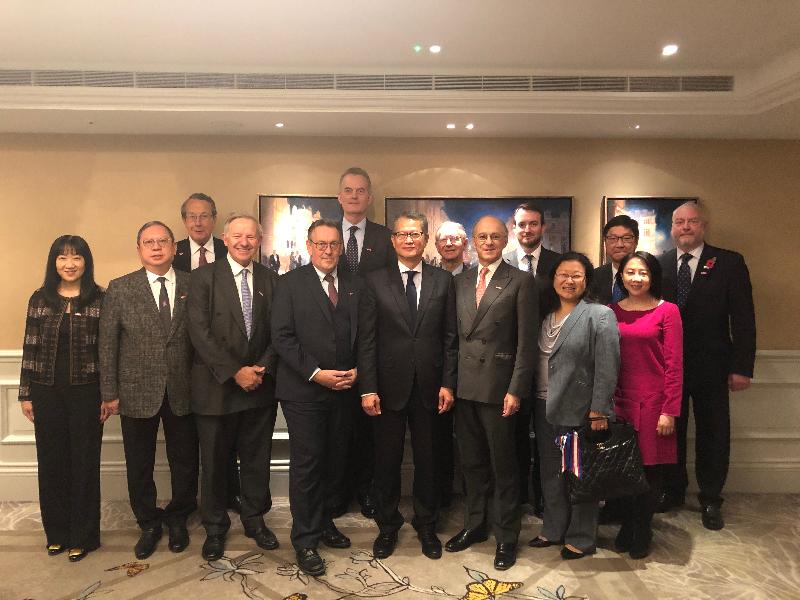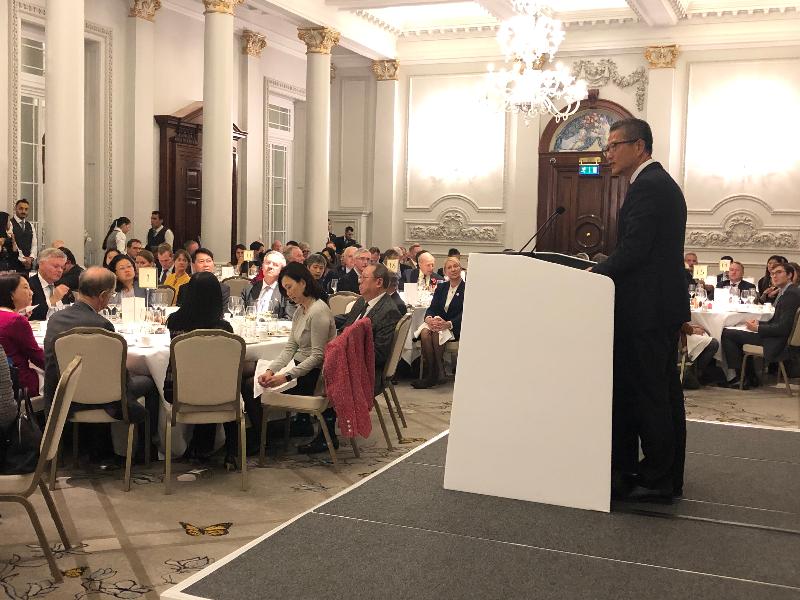Speech by FS at Hong Kong Association Luncheon in London (English only) (with photos)
*************************************************************************************
Lord (James) Sassoon, My Lords, Distinguished Guests, Ladies and Gentlemen – friends of Hong Kong,
Good afternoon.
I'm pleased to be here, in London, among friends. Here, where the autumn air and excitable politics of this grand global city serves as a welcome tonic – a refreshing reminder that testing times are hardly limited to Hong Kong.
But, of course, it is Hong Kong – the business now, tomorrow and long down the road – that you're here to hear more about.
The "now" remains a work in progress, I'm afraid. We've certainly had our fill of testing times since early June. And they're still with us.
I won't pretend to minimise the issues, their complexity and the powerful emotions they have provoked.
What I can say is that we are working to resolve the social unrest. We must, and we will, find a peaceful, rational and agreeable way forward.
Community-wide dialogue continues, through face-to-face meetings, through social media and other channels. We are reaching out. We are listening. We are responding. And we are determined to find solutions to address our challenges.
Those solutions include significant initiatives to tackle long-standing issues in housing and land supply. They were announced, together with livelihood and economic development measures, less than two weeks ago, in the Chief Executive's annual Policy Address.
Yet the initiatives, as substantial as they are, can only work if we hold fast to the fundamental principles that have long powered our remarkable success as an economy and a community. I'm speaking of the "one country, two systems" framework, the rule of law and our other institutional strengths, including an independent judiciary, a free and open society, and the free flow of information, people and capital. Taken together, they are, our unique advantages, and indeed, the very foundation of our continued prosperity and success.
These fundamental assets of Hong Kong will help us sustain the turmoil created by the present social divide. We'll need them, as well, to tackle the daunting external challenges that Hong Kong now faces.
We can start with the global economy, which has been losing momentum since the end of last year. The continuing, and dispiriting, trade war between the China and the United States is a major variable in the slowdown – globally and locally. Recent developments have led to some optimism that the two biggest economies in the world can find some interim compromise. We will see.
When it comes to Hong Kong, remember, we are a small and open economy. We will, inevitably, be affected by impediments to international trade flow.
Uncertainties abound. Cliffhangers everywhere. They include Britain's future in the European Union. The recent ratcheting up of tensions in the Middle East is also a cause for concern.
So it's not surprising that the Hong Kong economy grew only a nominal 0.5% in the first half of this year. Coupled with the impact from the local social unrest, we expect the negative growth in the second quarter would continue into the third quarter at even larger extent. Gloomy as it may sound, we need to brace ourselves for the very likely eventuality of negative growth for the full year.
The decided downturn is hitting our SMEs particularly hard. And our SMEs, as you know, are the heart and soul of the Hong Kong economy.
That's why, as Financial Secretary, I rolled out wide-ranging support measures in August and, again last month and the week before. They've been designed to safeguard jobs, help our SMEs with liquidity support and resources to explore new markets and, in general, lessen the financial difficulties the people of Hong Kong are now grappling with.
In total, the assistance adds up to over £2 billion, and it will make a difference. Meanwhile, we are actively monitoring the external and domestic environment and will roll out more measures as and when necessary. With ample and sound financial strength, we would not hesitate to utilise our financial reserves to implement timely and suitable counter-cyclical measures with a view to stimulating the economy and helping our community sail through the wave of economic downturn.
That's the now, in a nutshell. It's not likely to aid in the digestion of today's fine lunch, I'm afraid.
That said, I think I can add appetite to your afternoon tea. I can, because, despite the local and the global concerns, Hong Kong continues to flourish. Continues to achieve, in ways large and small.
And you need not take my word on that. Just look at, for example, our financial system. If you purely focus on the performance of our financial market from June till now, you might not have realised the social events we now face have, in fact, been happening in parallel in the same place.
The report card given to Hong Kong by different indices and ranking institutions have also been reassuring. Just last month, the Global Financial Centres Index once again ranked Hong Kong among the world's top three financial centres, behind only New York and gaining on London.
The Swiss-based World Competitiveness Yearbook recently named Hong Kong the world's second-most competitive economy. And, earlier this month, the World Economic Forum's Global Competitiveness Report ranked Hong Kong third, up from last year's 7th place.
Critical to those ringing international endorsements is Hong Kong's economic freedom. For the past 25 years in a row, the Washington-based Heritage Foundation has named Hong Kong the world's freest economy. Earlier this year, Canada's Fraser Institute ranked Hong Kong No. 1 in its Economic Freedom of the World report – as it has done every year since its first report was published, in 1996.
But perhaps the most fundamental attributes of Hong Kong that continue to attract business are our unique institutional strength and unparalleled competitiveness, which, despite the challenges we have experienced over the years, remain deeply intact. I would not need to name many - our "one country, two systems" arrangement, rule of law, independent judiciary, free flow of capital, goods, information and talent as well as our simple and low tax regime, world class professional services, freely convertible currency, and the unique position in China's economic development strategies.
These are the very key reasons why more than 9 000 overseas and Mainland companies maintain an office in Hong Kong. That number, released just last week, is up some 10% over 2017 totals. It includes well over 700 UK companies, I should add.
They're in Hong Kong – you're in Hong Kong – because no other economy can bring the world to Mainland markets like Hong Kong can. And no other economy can take Hong Kong's place as China's window to global capital, expertise and practice.
The point here is that Hong Kong is as national as it is international. For example, Hong Kong is a leading financial centre and China's global financial centre. And that is not about to change.
Indeed, the Mainland looks to Hong Kong, to our capital formation and our financial and professional services prowess, to help drive the Belt and Road Initiative and the Guangdong-Hong Kong-Macao Greater Bay Area development. Both are national priorities. Both will create far-reaching opportunity for Hong Kong, and the companies that partner with us.
The Greater Bay Area, brings together Hong Kong, Macao and nine thriving cities in the Pearl River Delta, is an economic super zone. The cluster city development boasts a collective population of more than 70 million consumers and a combined GDP of some US$1.6 trillion. That's similar to the GDP of Korea.
The Greater Bay Area outline development plan, released earlier this year, looks to Hong Kong to drive several sectors.
The huge relatively affluent population, the vibrant tech sector and the economic scale of the GBA spell outsized opportunity for Hong Kong, in areas such as IPOs, private equity, green finance, asset- and wealth-management, insurance, family offices and many professional as well as high-value added services.
Innovation and technology is at the heart of the GBA's vision. And Hong Kong's fast-emerging I&T sector is destined to play a key role in its rise as a global hub for innovation and technology.
In partnership with Shenzhen, we are now developing an Innovation and Technology Park along the Hong Kong-Shenzhen border. On completion, it will be four times the size of the current Science and Technology Park in Tai Po. It will be the ideal place for I&T research institutions and companies around the world to establish their presence to leverage on the combined competitive advantages of Hong Kong, Shenzhen and the nearby advanced manufacturing bases.
In fact, our I&T start-up businesses are thriving, the ecosystem is fast growing, with Government's substantial financial commitment of some £10 billion over the past 3 years and a wealth of complementary facilitative policies and measures.
Take financial technology as an example. At last count, some 550 fintech companies and start-ups were operating in Hong Kong. And with the signing of the UK-Hong Kong Fintech Bridge Agreement two years ago, our bilateral cooperation in fintech has expanded at government, regulator and industry levels.
Next week, November 4 - 8 by the way, is Hong Kong Fintech Week. The annual event will attract some 10 000 fintech players from all over the world, including, I'm pleased to note, a UK delegation – in Hong Kong to showcase UK fintech's talent and technology.
Yes, alongside the protests, the business of business rolls on, unabated. Hong Kong continues to create the connections and platforms that help us all excel.
If not today, then tomorrow. You can bank on that. Which reminds me: we'll very soon have eight virtual banks open for business, to help you do just that.
Thank you. I'm happy now to take your questions. Whether you'll be happy with my answers, is another question.
Ends/Wednesday, October 30, 2019
Issued at HKT 9:00
Issued at HKT 9:00
NNNN




